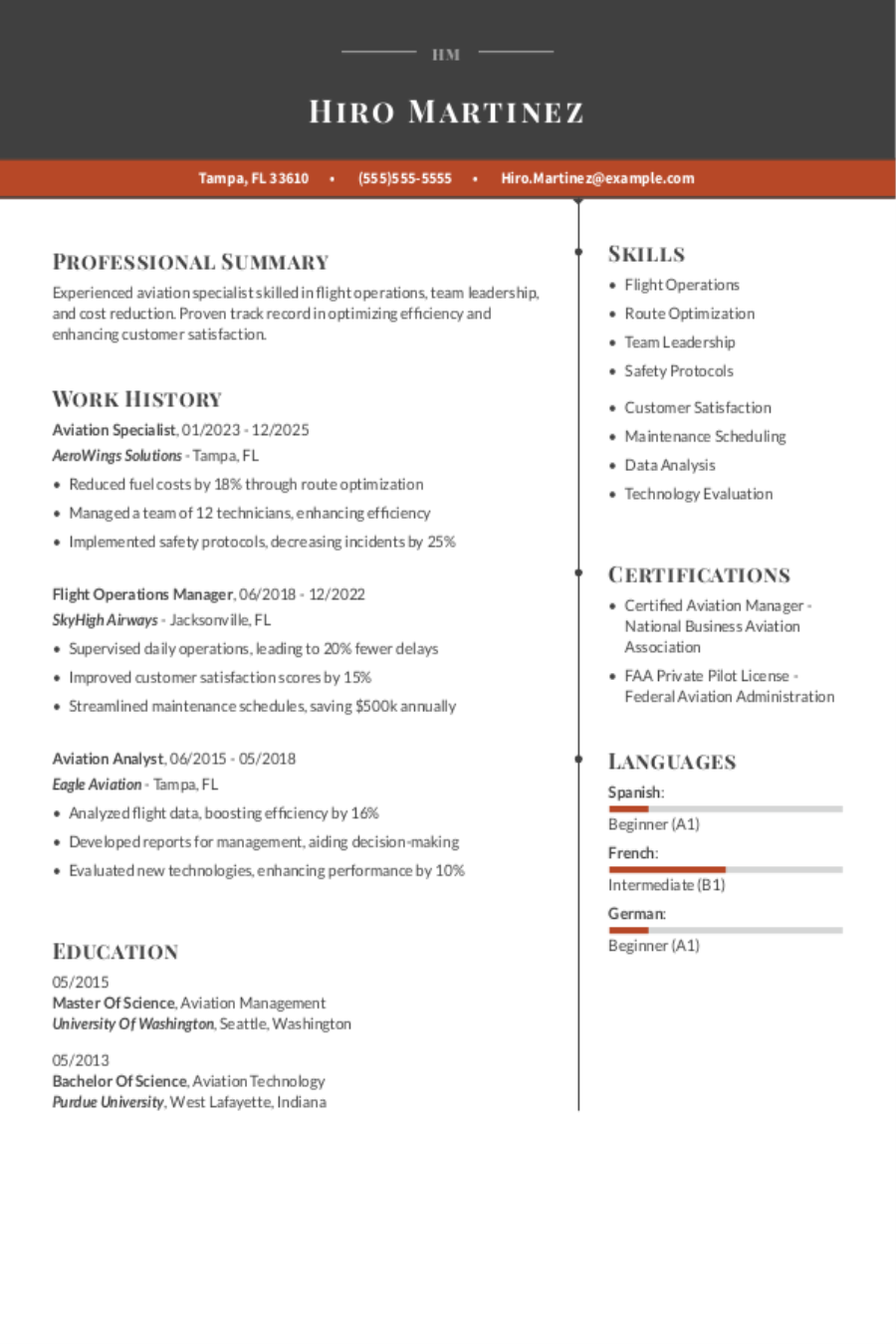Popular Tutor Resume Examples
Entry-level tutor resume
An entry-level resume for a tutor should emphasize academic achievements, subject expertise, communication skills, and any tutoring or mentoring experiences to demonstrate teaching capability.
Places skills over experience: Choosing a functional resume format is strategic for this entry-level tutor, as it highlights their skills in personalized education and performance tracking.
Focuses on goals: This job seeker demonstrates a strong commitment to educational excellence, using innovative strategies and personalized approaches to improve student performance and engagement.
Mid-career tutor resume
A mid-career tutor resume should emphasize a harmonious mix of teaching experience, subject expertise, and continuous professional development to effectively demonstrate growth and impact in education.
Begins with a powerful summary: This resume opens with a professional summary that succinctly highlights the tutor's extensive experience and successful impact on student performance, allowing recruiters and ATS systems to quickly recognize valuable qualifications.
Employs active language: Using strong action verbs like "increased," "mentored," and "led" showcases your proactive approach and measurable success in student outcomes.
Experienced tutor resume
An experienced tutor's resume should highlight key teaching achievements and demonstrate a clear path of professional growth in education, making it easy for employers to assess their qualifications.
Optimized for ATS: This resume uses a clear and professional template, featuring an elegantly styled header along with an ATS-friendly resume layout that ensures optimal readability for both employers and automated systems.
Highlights experience: This resume opens with a powerful summary that showcases over a decade of tutoring experience and highlights the job seeker's proven track record in improving student outcomes. This immediately sets a professional tone, illustrating both qualifications and commitment to educational excellence.
No experience tutor resume
A resume for an applicant with no experience should highlight relevant skills, educational background, and any volunteer or mentorship roles to showcase the applicant's ability to support and engage students effectively.
Uses a simple style: This resume uses a neat and simple layout that clearly illustrates the candidate's abilities without distractions.
Overcomes lacking experience: Including volunteer work and extracurricular activities on a resume demonstrates valuable skills and commitment, which improves the profile of applicants with limited professional experience in tutoring.
Tutor Resume Template
Looking for a way to showcase your skills? Use this professional tutor resume template as your foundation—simply personalize it with your unique information.
Emma Park
Northwood, OH 43619
(555)555-5555
Emma.Park@example.com
Professional Summary
Dedicated tutor with 5 years' experience enhancing academic performance. Expertise in curriculum development, student assessment, and educational technology. Proven track record of increasing student engagement and success rates.
Skills
- Curriculum Development
- Student Assessment
- Educational Technology
- Mentoring
- Lesson Planning
- Learning Strategies
- Behavior Management
- Communication
Work History
Tutor
Bright Future Learning Center - Northwood, OH
October 2023 - October 2025
- Improved student grades by 25%
- Conducted 150+ tutoring sessions
- Created custom lesson plans for 25 students
Academic Coach
Inspire Education Center - Northwood, OH
January 2021 - September 2023
- Increased student engagement by 30%
- Mentored 50 students individually
- Developed 5 new curriculum modules
Learning Specialist
Knowledge Tree Academy - Cleveland, OH
January 2020 - December 2020
- Reduced dropout rates by 15%
- Led workshops for 200 students
- Assessed learning needs of 100 students
Certifications
- Certified Professional Tutor - National Tutoring Association
- Advanced Teaching Strategies - American Education Institute
Education
Master of Education Educational Psychology
University of California, Berkeley Berkeley, California
June 2019
Bachelor of Arts English Literature
Stanford University Stanford, California
June 2018
Languages
- Spanish - Beginner (A1)
- French - Beginner (A1)
- Mandarin - Beginner (A1)
Must-Have Skills on a Tutor Resume
A strong skills section is important for creating a standout resume.
Education and training professionals play a vital role in fostering growth and development. The skills you highlight should reflect your ability to support learning and guide others toward success. Your resume is your opportunity to demonstrate how you contribute to progress and positive outcomes in learning environments.
The following data highlights the most sought-after hard and soft skills for various tutoring roles according to our internal resume analysis.
When you’re set to improve your resume with relevant skills, try using our AI Resume Skills Generator. It identifies both hard and soft skills tailored to your job title, helping you craft a comprehensive and personalized skill profile.
Writing Your Tutor Resume
Having explored these effective resume samples, you are now equipped to dive into the process of creating your own. We will walk you through how to write a resume step by step, focusing on each section along the way.
List your most relevant skills
An effective skills section on your tutor resume should focus on both hard skills, like subject expertise and lesson planning, as well as soft skills such as patience and communication.
To optimize this section, carefully analyze the keywords from the job listing related to the role. Incorporating these keywords not only demonstrates that you are a good fit for the position but also improves your chances of passing through applicant tracking systems. By aligning your skills with what employers seek, you make a compelling case for why you should be considered for the tutoring position.
Example of skills on a tutor resume
- Proficient in creating customized lesson plans tailored to individual learning styles
- Experienced in using various educational technologies to improve student engagement
- Strong communicator with the ability to build rapport and motivate students
- Patient and adaptable, ensuring a supportive learning environment for all students
A strong skills section showcases both hard and soft skills, demonstrating an applicant's ability to tackle technical tasks while effectively collaborating with others. This balance highlights their readiness for diverse challenges in the tutoring environment.
Highlight your work history
Your work experience section should showcase your achievements and the impact you've made on your students' learning. Use this section to illustrate how you applied your tutoring skills effectively, including relevant keywords that align with the job description of the role you’re applying for.
For each entry in your work experience, make sure to include important details such as your title, the name of the educational institution or employer, and the dates you worked there. This information is important as it helps potential employers understand your background and qualifications clearly, establishing your credibility.
Example of a tutor work experience entry
- Tutor
Sunshine Learning Center - Los Angeles, CA
August 2021 - Present - Develop personalized lesson plans that cater to individual student needs, improving comprehension and retention by 30%
- Facilitate engaging tutoring sessions in subjects including math and science, resulting in a 95% pass rate among students
- Foster a supportive learning environment that encourages student questions and active participation, improving confidence levels
- Monitor and assess student progress regularly, providing feedback that leads to an average grade improvement of one letter grade over one semester
- Collaborate with parents and educators to align on educational goals, ensuring consistency in support strategies across home and school settings
Quantifying your achievements as a tutor is vital to illustrate your impact on student success. For example, stating that you helped increase students' test scores by an average of 20% demonstrates your effectiveness and commitment to their academic growth.
Include your education
The education section of your tutor resume should list your degrees and diplomas in reverse-chronological order, starting with the most recent. If you hold a bachelor's degree or higher, you can omit your high school diploma.
If you are currently pursuing a degree or have not completed your studies, indicate the highest level achieved and include an expected graduation date. You may also want to add bullet points detailing significant coursework or academic accomplishments that relate directly to tutoring.
Common certifications for a tutor resume
- Certified Tutor (CT) – National Tutoring Association (NTA)
- Master Tutor (MT) – College Reading & Learning Association (CRLA)
- Subject Matter Expert Tutor (SME) – Association for the Tutoring Profession (ATP)
- Professional Tutor Certification (PTC) – National College Learning Center Association (NCLCA)
Showcase publications and research
Publications aren't an expected qualification for a tutor, but they can be very helpful for a tutoring resume. If you've written for student papers, journals, or blogs, add these to your resume.
When you have several items to display, create a dedicated publications section, which allows you to present them prominently. However, if you have just one or two significant publications, consider integrating them into relevant sections like education or experience. Ensure that you follow the citation format commonly accepted in academia (e.g., APA) for consistency and professionalism.
Example of a publications section
- Smith, J. & Lee, K. (2023). "Innovative Strategies for Effective Tutoring". Journal of Educational Practices, 10(1), 22-35.
- Johnson, A. & Brown, M. (2022). "The Role of Technology in Modern Tutoring". Educational Technology Review, 5(3), 45-60.
- Research Contributor, National Tutoring Project (2021–2022). "Student Engagement Research Contribution". Analyzed student engagement data across tutoring sessions.
- Chen, H., Johnson, A., et al. (2024). "Collaborative Learning Techniques: A Study on Peer Tutoring". International Journal of Education, 15(2), 101-115.
Sum up your resume with an introduction
Creating a compelling profile section on your resume is important for making a strong first impression. This section serves as your elevator pitch, giving potential employers a snapshot of your qualifications and what you bring to the table.
For seasoned applicants, using a professional summary is an excellent way to showcase significant accomplishments and relevant skills. If you have limited experience, consider writing a goals-focused resume objective that emphasizes your dedication to career growth.
Professional summary example
Dedicated tutor with over 5 years of experience in personalized education settings. Demonstrated success in improving student learning outcomes through tailored lesson plans and innovative teaching strategies. Proficient in subject-specific instruction, assessment development, and fostering a positive learning environment.
Resume objective example
Enthusiastic tutor eager to use strong communication, patience, and adaptability skills to foster a positive learning environment for students. Committed to supporting academic growth and improving student confidence through tailored lesson plans and engaging instructional techniques.
When crafting your resume profile for a tutor position, focus on incorporating relevant keywords from the job description. This is your chance to highlight important skills and qualifications that align with what employers are seeking. Doing so not only makes your resume stand out but also helps it navigate through applicant tracking systems effectively.
Add unique sections to set you apart
Including optional resume sections can help you stand out as a tutor by showcasing your unique qualifications. These sections allow you to highlight what makes you an exceptional applicant beyond just your core teaching skills.
By sharing relevant hobbies and volunteer experiences, you illustrate not only your commitment to education but also the values that drive you. For instance, involvement in community tutoring programs or educational workshops demonstrates your dedication to helping others succeed. This gives potential employers insight into your working style and passion for teaching, ultimately making your application more compelling.
Three sections perfect for a tutor resume
- Tutoring experience: Your tutoring background highlights your ability to convey complex concepts clearly. Include specific subjects you have tutored, the age groups of students, and any tailored approaches you've used to improve learning outcomes.
- Educational certifications: Relevant certifications demonstrate your commitment to educational excellence. List certifications related to teaching or tutoring methodologies, including the issuing organizations and dates obtained.
- Student feedback and achievements: Positive feedback from students shows your effectiveness as a tutor. Provide examples of testimonials, improvement metrics, or notable achievements of your students that resulted from your guidance.
5 Resume Formatting Tips
- Choose a format that matches your career stage.
When selecting a resume format, consider your experience level. If you have substantial experience, a chronological format can effectively showcase your career progression. For those just starting out, a functional resume highlights skills over work history. A combination format also works well to cohesively present both skills and experiences.
- Pick a smart resume template.
Using a professional resume template is important for ensuring your document stands out. A well-structured template improves readability, helping hiring managers quickly grasp your qualifications. If you prefer creating one yourself, focus on simplicity and choose fonts that are easy to read and ATS-friendly.
- Select an appropriate font.
Choose a clean and professional font to improve resume readability. Fonts like Helvetica, Georgia, or Verdana ensure clarity and appeal to both ATS systems and hiring managers.
- Use consistent formatting.
Ensure your resume is neatly aligned with uniform margins to create a polished and professional look that improves readability.
- Keep your resume to one or two pages.
When outlining your resume, keep in mind that resumes should be one page long. Limiting the length allows you to present your most relevant experiences clearly and succinctly. Concentrate on highlighting key details that showcase your skills effectively.
What’s the Average Tutor Salary?
Tutor salaries vary based on location, career level, and qualifications.
This data, provided by the Bureau of Labor Statistics, will show you expected salary ranges for tutors in the top 5 highest-paying states, including the District of Columbia. The figures reflect the most current salary data available, collected in 2024.
- Full Range
- Most Common (25th–75th percentile)
- Average
Wyoming
Most common: $51,830 - $79,250
Rhode Island
Most common: $51,260 - $77,460
Massachusetts
Most common: $41,780 - $76,340
New York
Most common: $35,890 - $69,160
Connecticut
Most common: $40,710 - $72,500
Tools for Your Job Search
Are you ready to apply for that tutoring position you’ve been considering? Before sending in your application, take advantage of our ATS Resume Checker. This essential tool offers insights into how well your resume meets the criteria set by automated systems used by many educational institutions for initial applicant screening.
Looking to elevate your resume further? Our AI Resume Builder provides tailored recommendations that align with your teaching background and expertise. With professionally designed templates, it helps showcase your skills and achievements effectively, making a strong impression on hiring managers.
Frequently Asked Questions
Last Updated: November 14, 2025
Yes. A cover letter is important because it adds depth to your resume and creates opportunities for communication with potential employers. It’s your chance to articulate why you’re passionate about the tutoring role and how your background makes you a perfect fit. So, don’t hesitate—write a cover letter that highlights your strengths!
For a hassle-free solution, consider using our AI Cover Letter Generator. In just minutes, you can create a tailored cover letter that stands out. Plus, there are various cover letter template options available to ensure it matches your resume perfectly, making your application more cohesive and professional.
A resume is a concise document, typically spanning one to two pages, that highlights your skills and experiences relevant to a specific job. In contrast, a curriculum vitae (CV) can extend over several pages, offering extensive details about your academic background, research contributions, publications, and professional experiences.
You’ll often need a CV for roles in academia, science, law, or medicine. If you think a CV is appropriate for your next application, our online CV Maker can assist you in crafting an impressive document quickly. Choose from various customizable CV templates designed for different industries and career levels to boost your job search.
To write a strong CV, focus on organizing your information under clear headings such as education, experience, skills, and certifications. Select professional templates that improve readability and are compatible with applicant tracking systems. Tailor your CV for each job application by incorporating relevant keywords from the job description to make it stand out.
For additional guidance, take time to explore CV examples from professionals in your field. Analyzing these samples can provide insight into effective presentation styles and highlight how successful applicants showcase their qualifications effectively.
To create an effective skills section as a tutor, merge your technical skills, such as skill in educational software and lesson planning tools, with vital soft skills like communication and patience. Highlight specific instances in your experience where these skills led to improved student understanding and engagement to demonstrate their impact.
Many tutors begin as teaching assistants or in similar roles, gaining experience. Through advanced degrees or specialized training, they can progress to senior tutor positions or educational specialists within schools and institutions.
When applying for tutor positions, briefly state your teaching aspirations in your resume summary. For a deeper connection, passionately outline your goals in your cover letter. Target roles that not only use your skills but also provide avenues for professional growth and advancement in education.
Was this information helpful? Let us know!
Keith is a Certified Professional Resume Writer (CPRW) and trusted media source in the career industry with over a decade of experience helping job seekers stand out.
More resources

Only 1 in 10 Resumes Include Measurable Results, New Analysis of 18.4M U.S. Resumes Finds
Resume Now takes a closer look at measurable results on resume...

Top Entry‑Level Careers That Are Fast‑Growing, Higher‑Paying, and AI‑Resistant
Artificial intelligence is touching more parts of work every y...

What Does It Mean if an Interviewer Says "Good Luck" or "We'll Be In Touch"?
Read on to learn the meaning behind these standard post-interv...

Compliance Resume: Examples & Templates
As a compliance professional you need a resume that showcases...

Top Architecture Resume Examples & Pro Writing Tips
As an architect your resume must highlight essential skills l...

Aviation Resume: Examples & Templates
As an aviation professional you need a resume that showcases ...

